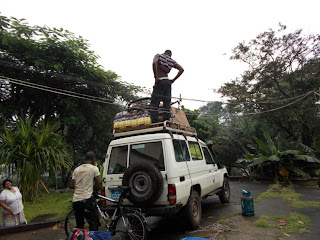After the memorable move, we arrived in Njala on Saturday mid-afternoon with no idea of where my place was. After numerous discussions with the local folks and many false starts, we arrived at my little bungalow pictured here. It’s simple. Very simple. I have a living room, bedroom, bathroom, enclosed front porch, and an attached kitchen but it is located off the porch so cooking won’t heat up the house. Well, that is it wouldn’t heat up the kitchen if I had a working stove!

We sure got our lines crossed when it came to Peace Corps preparations for site. I came with just about nothing that would be useful…but a few things had potential. Just to back up a bit, we made a mad trip last Friday to Freetown for “essentials” so I purchased an electric hot water kettle, a small half-sized refrigerator, a gas stovetop with two burners, and a fan. Alas, I ran out of money with those purchases…they amounted to 1,625,000 Leones so I couldn’t buy the propane gas tank, the regulator, or the tubing that connects them…no credit cards here! But, here’s where the potential comes into play though this get more bleak before it gets better. Upon arrival at site, I learned that we only have power from 7:00 p.m. to midnight every day (five hours) which makes that early morning cup of coffee from the hot water kettle sort of tough. The fridge blew out my power strip the first night I was there so that has turned into a very expensive cupboard to keep my dry goods (which I can’t use since I don’t have gas with which to cook). The fan? It simply doesn’t work. BOA…broken on arrival.
So, those are the minor irritants I initially faced. Undaunted, I put my belongings into logical places and took a stroll around the place. I have my own papaya tree which could be really cool. The fruit is green now, but as I said, we are looking for potential so I’m happy.
I biked down into the village which turned out to be literally all thatched roof huts and people going about their daily chores like “brooking” which is their term for doing laundry, sweeping their yards with homemade whisk brooms, and generally hanging out. I think I scared the heck out of them, though. Here comes this white guy on a bike with a helmet atop his head and it seemed to only turn heads. I didn’t take any pictures because I thought I was really intervening too much on their privacy by just being there. As I get to know the villagers, many of whom work on campus, I’ll fill in the photos. It this just as picturesque as anything you’ve seen in National Geographic.
On my way back, I located a small, two-stand open air market and purchased a dozen bananas for 1000 Leones (a real bargain) and headed directly home. Here is my entry into the living room. It’s simple but Peace Corps only requires two chairs so I made out big time. I have a dining room table, four chairs, four easy chairs with end tables. As Halley calls it, you’re in Posh Corps!
Then there is the bedroom. I have a nice bed, a couple of bureaus to store my stuff (except for the fact that all the drawers are speckled white with mildew…hey, it’s rainy season!).
The bath is really snazzy with modern tile, a shower (that works…cold water only from the river but I’m thrilled), a sink, and an operating toilet. This really bests the Turkmenistan water closets since Halley’s were squat outhouses only…in all, I figure it all evens out.
So, that’s my house. I’m located at the edge of campus so my rearview overlooks a swampy, wooded area that gives way to rolling hills but it is ever so quiet here. Other than the songs of crickets at night and the chirruping of the birds in the morning (none of which I recognize), it is the exact opposite of West Barnard Street with its bustle and student braggadocio. I think I’m going to like it here…
So, as I mentioned, the water that comes into the house is from the river. That’s good enough for laundry, showering, and flushing but it certainly isn’t potable. I went to the nearby well the next morning with the bottom of my waste basket (supplied by the university and reasonably clean) and after my litany of taught Krio like, “Padi monin, o” and “Aw di bodi?” I found we just stared at each other until my turn came to draw the water. Oops, little did I know, I’m in Mende land which is the predominant tribe here in the south and in training, we didn’t even learn how to say “hello” in that language. Oh, I have a lot to learn. Anyway, the well is about as far from my house as my office was on campus so it’s good exercise and I get cleaner water in the bargain.
Peace Corps provided us with these uber-ultra-filters so all we have to do is dump the water in the top, wait three or so hours, and we have clean water…well, sort of. Our PCMO (that’s Peace Corps Medical Officer) said it was 98% effective so to be extra sure of purity, we should add a couple of drops of bleach per liter into the final batch and then we are safe. Well, PC forgot to give us the bleach they had promised so I used iodine tablets from my medical pack which proved efficacious though it’s a bit nasty to the taste. Let’s face it, when you’ve been sweating all day anything wet tastes great. BTW, the inside temperature in my house is about 92 degrees during the afternoon and evening but let’s look at the bright side…we still have the hot, dry season coming in December! I hope I get a working fan by then…






























